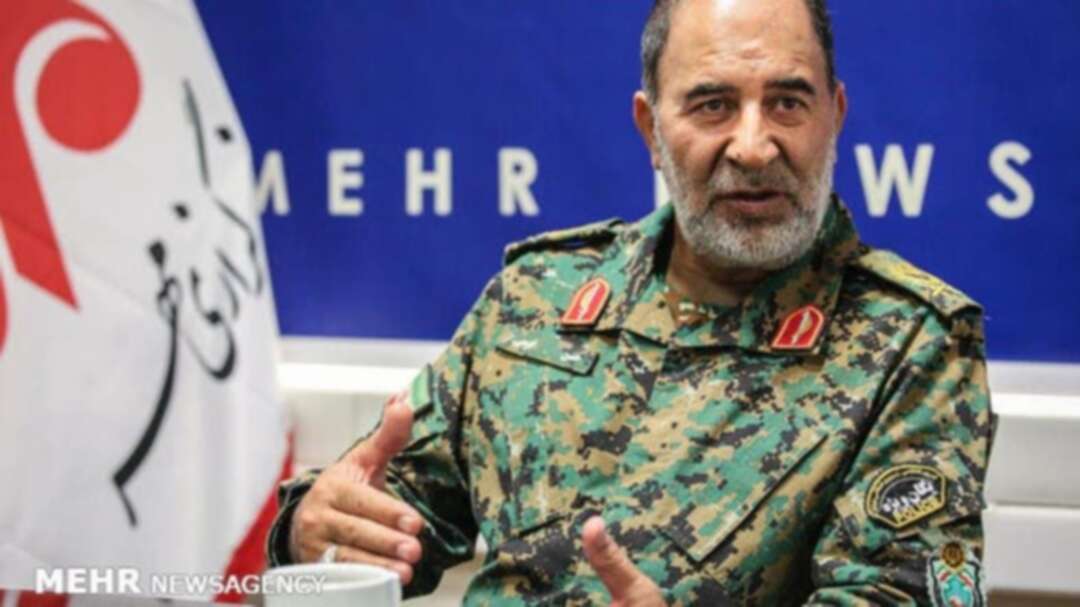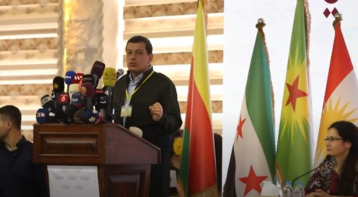-
Iran sent thousands of troops to Iraq for Shia pilgrimage: Iranian commander

Iran has sent 7,500 members of its special unit law enforcement force to Iraq, according to the force’s commander, amid accusations from Iraqi protesters that Iranians have been directly involved in the crackdown on the protests in Iraq.
Iran is sending these forces to provide security for the Arbaeen Pilgrimage, a Shia religious ceremony, claimed the commander of the “special unit law enforcement force” Gen. Hassan Karami, reported the semi-official Mehr news agency on Monday.
Iran also has undercover agents in the crowds to control the situation, he said.
The special unit law enforcement force is responsible for dealing with protests in the country, and it was heavily involved in the crackdown on the protests that broke out in Iran between December 2017 and January 2018 in over 100 cities.
During those protests, 30 Iranians were killed and over 5000 were arrested, 50 of whom were tortured to death.
The thousands of Iranian forces sent to Iraq have been sent to help suppress the current protests in the country, say some observers.
The Iraqi protesters have accused Iran of being directly involved in the crackdown of their protests.
An Iraqi protester interviewed by Reuters on October 3 said that Farsi-speaking Iranians, not Iraqi forces, have been shooting at people during Iraq’s recent deadly protests.
“There is no work, you come to protest, they fire at you. Live gunfire. They are all Iranian speaking in Farsi. You want to speak to them they answer in Farsi. The Iraqis would not fire at you,” the Iraqi protester told Reuters.
At least 110 people have been killed across Iraq and more than 6,000 wounded, with protesters demanding the removal of Prime Minister Adil Abdul Mahdi and a government they accuse of corruption.
Iraqis have also been shouting slogans against the Iranian presence in their country. Videos of the protests on social media show protesters tearing images of Iran’s Supreme Leader Ali Khamenei in the Shia holy city of Karbala.
Iran is influential in Iraq, including military personnel on the ground. Iraqi Prime Minister Adil Abdul Mahdi is a former member of the Supreme Islamic Iraqi Council, a Shia political party with close ties to Iran.
Many of the Popular Mobilization Units (PMU) militias are loyal to Iran, and the PMU’s deputy commander Jamal Jaafar al-Ibrahimi – known by his nom de guerre Abu Mahdi al-Mohandes – is a key Iranian ally. Mohandes is also the leader of Katai’b Hezbollah, the terrorist organization accused of attacking Saudi Arabian oil pipelines in May.
Iran’s Islamic Revolutionary Guard Corps (IRGC) is also influential in Iraq. Qassem Soleimani, the commander of the IRGC’s Quds Force, has repeatedly travelled to Iraq in violation of UNSCR 2231, which established a travel ban as part of the Iran nuclear deal.
Khamenei, in his first reaction to the violence in Iraq, has called the protests a “conspiracy” by the enemies and an attempt to “sow discord” between Iran and Iraq.
Hossein Shariatmadari, one Khamenei’s representatives, and the head of Iran’s hardline Kayhan newspaper, had reiterated accusations by top Iranian officials claiming that the protests in Iraq were instigated “by America and foreign elements,” and called on Iraqis to “occupy the US embassy like the Iranians did in 1979.”
A senior Iranian cleric and member of Iran’s Assembly of Experts’ presiding board accused Saudi Arabia and the US of being behind the protests in Iraq.
The Iraqi protesters had seen “special training in American and Saudi camps,” Ayatollah Abbas Ka’bi told the semi-official Fars news agency on Saturday.
You May Also Like
Popular Posts
Caricature
BENEFIT Sponsors BuildHer...
- April 23, 2025
BENEFIT, the Kingdom’s innovator and leading company in Fintech and electronic financial transactions service, has sponsored the BuildHer CityHack 2025 Hackathon, a two-day event spearheaded by the College of Engineering and Technology at the Royal University for Women (RUW).
Aimed at secondary school students, the event brought together a distinguished group of academic professionals and technology experts to mentor and inspire young participants.
More than 100 high school students from across the Kingdom of Bahrain took part in the hackathon, which featured an intensive programme of training workshops and hands-on sessions. These activities were tailored to enhance participants’ critical thinking, collaborative problem-solving, and team-building capabilities, while also encouraging the development of practical and sustainable solutions to contemporary challenges using modern technological tools.
BENEFIT’s Chief Executive Mr. Abdulwahed AlJanahi, commented: “Our support for this educational hackathon reflects our long-term strategic vision to nurture the talents of emerging national youth and empower the next generation of accomplished female leaders in technology. By fostering creativity and innovation, we aim to contribute meaningfully to Bahrain’s comprehensive development goals and align with the aspirations outlined in the Kingdom’s Vision 2030—an ambition in which BENEFIT plays a central role.”
Professor Riyadh Yousif Hamzah, President of the Royal University for Women, commented: “This initiative reflects our commitment to advancing women in STEM fields. We're cultivating a generation of creative, solution-driven female leaders who will drive national development. Our partnership with BENEFIT exemplifies the powerful synergy between academia and private sector in supporting educational innovation.”
Hanan Abdulla Hasan, Senior Manager, PR & Communication at BENEFIT, said: “We are honoured to collaborate with RUW in supporting this remarkable technology-focused event. It highlights our commitment to social responsibility, and our ongoing efforts to enhance the digital and innovation capabilities of young Bahraini women and foster their ability to harness technological tools in the service of a smarter, more sustainable future.”
For his part, Dr. Humam ElAgha, Acting Dean of the College of Engineering and Technology at the University, said: “BuildHer CityHack 2025 embodies our hands-on approach to education. By tackling real-world problems through creative thinking and sustainable solutions, we're preparing women to thrive in the knowledge economy – a cornerstone of the University's vision.”
opinion
Report
ads
Newsletter
Subscribe to our mailing list to get the new updates!






















